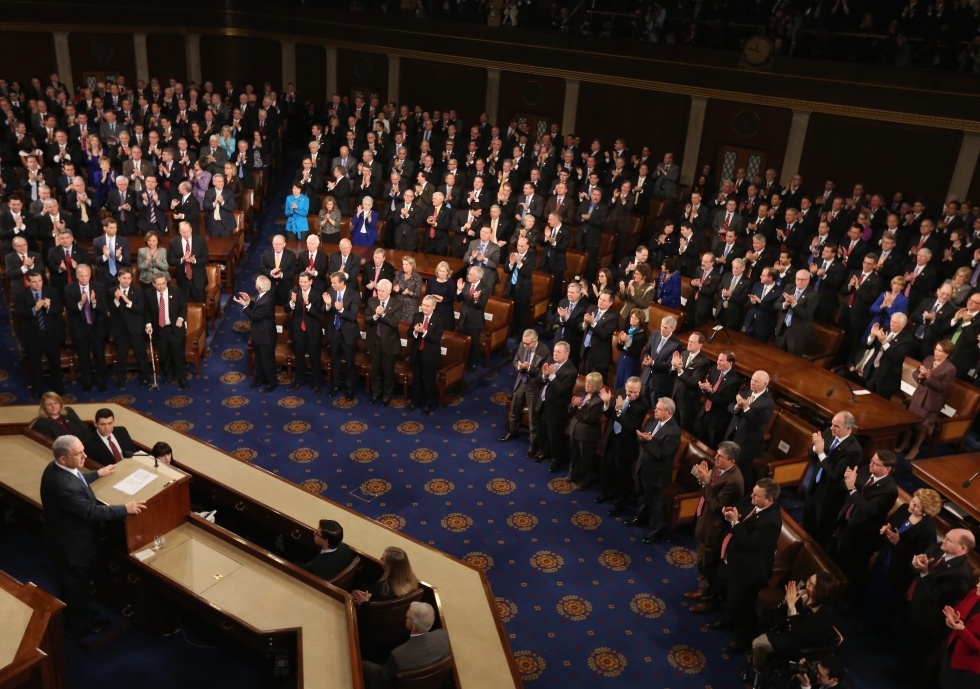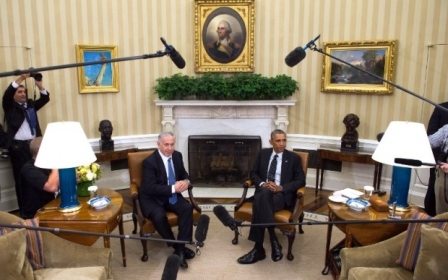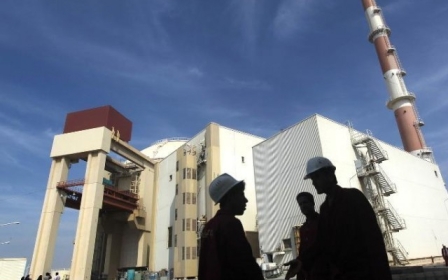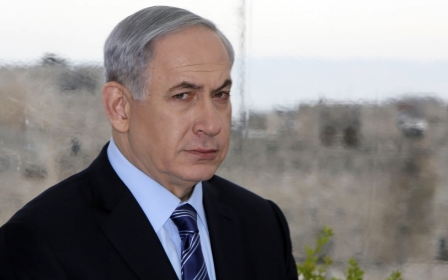Iran sees opportunity in Netanyahu’s congress speech

Israeli Prime Minister Benjamin Netanyahu addressed the US Congress today on his fears over a possible deal with Iran to contain the Islamic Republic’s controversial nuclear programme.
Much of the focus in the run-up to the speech centred on Netanyahu’s brazen partisan approach, in favouring the US Republicans over the Democrats, and effectively riding roughshod over the US government.
There has also been considerable speculation on the possible long-term damage to US-Israeli relations as a result of Netanyahu’s single-minded determination to influence US policy on Iran, at the expense of President Obama and his team.
Conversely, there has been comparatively little analysis on how Iran perceives Netanyahu’s actions and to what extent the Islamic Republic considers the hawkish Israeli Prime Minister’s Congress speech as an opportunity, as opposed to a threat.
In the immediate term Iran is determined to resist a “bad” deal over the nuclear programme as a result of the pressures exerted on the US by the Israeli Prime Minister and his supporters in the American political establishment. Longer term, the Islamic Republic hopes that the longstanding Israeli-American convergence on Iran policy is undermined by Netanyahu’s actions.
Deal or no deal
Whilst Netanyahu clearly wants to sabotage any deal with Iran on the long-running dispute on its nuclear programme, his appearance at the US Congress, against the express wishes of the US government, is in part calculated to apply pressure on Obama to make more demands from the Iranians.
This strategy appears to be working for now, as evidenced by Obama’s explicit demand for a 10-year freeze on the nuclear programme and a specific one-year time frame from breakout to the production of a nuclear weapon.
Obama’s public demands have already been robustly rebuffed by Iranian foreign minister and chief nuclear negotiator Mohammad Javad Zarif who dismissed them as “excessive” and “illogical”. What is not immediately clear is to what extent Obama’s latest tough public posture will impact the sensitive negotiations between Zarif and his US counterpart John Kerry.
Negotiations are at a critical stage with a 31 March deadline for reaching a deal approaching fast. It is tempting to conclude that Netanyahu has already achieved most of his objective of damaging the talks even before he delivers his speech.
The US president has publicly staked out a very clear position (i.e. 10-year freeze) and the Iranian foreign minister has publicly rejected those demands in the strongest diplomatic terms possible. It is difficult to imagine the public posturing (instigated by Netanyahu) not casting a shadow over the latest round of talks between Zarif and Kerry in Montreux, Switzerland.
Yet despite the setback, Iran is at its strongest point ever to negotiate a favourable deal with the United States and the wider international community. Foremost, the Iranian negotiating team enjoys the backing of Iran’s leader Ayatollah Seyed Ali Khamenei. And opposition from hardliners notwithstanding, the often fractured Iranian political establishment is united in backing Iran’s negotiators.
Geopolitics also favours Iranian nuclear negotiators. Growing fears of a fallout from the Syrian conflict, notably the escalating threat from the so-called Islamic State and its army of Western jihadists, has softened the US positon on Syria, and established a foundation for a possible convergence of Iranian-US interests in that embattled country.
This convergence already exists in neighbouring Iraq, where Iran is spearheading the pushback against the so-called Islamic State and its local tribal allies. For the foreseeable future at least the US is dependent on Iranian goodwill to create more favourable conditions in Iraq and across the region.
Neutralising Israel
Netanyahu’s brazen attempt to influence US strategic posture on Iran may be outrageous in terms of style, but on substance it is nothing new. For well over two decades Israel has disproportionately influenced American policy on Iran.
Part of the reason behind this spectacular Israeli success is of course rooted in well-established lobbying campaigns in America, spearheaded by the American Israeli Public Affairs Committee (AIPAC) and other powerful pro-Israel lobby groups.
However, the longstanding Cold War between Iran and the US, beginning with the victory of the Iranian Revolution in 1979, has often clouded the judgement of US leaders, policy-makers and strategists. Reflexive US animosity towards Iran has served to align American policy with Israel.
The tentative thaw in mutual animosity, driven by geopolitics and a new pragmatic administration in Tehran, is clearly inimical to Israeli interests. It is in this context that Iranian strategists may be hoping that the damaging aspects of Netanyahu’s appearance at Congress may in time generate a shift in US posture on Iran.
Calculations along these lines may have prompted former Iranian president Ali Akbar Hashemi Rafsajani (who is strongly connected to Iranian foreign policy strategists) to draw a parallel between Netanyahu and Iranian hardliners opposed to a nuclear deal.
Addressing a conference on regional development, Rafsanjani claimed that the biggest challenge for the Rouhani administration is to resolve core foreign policy issues, a thinly disguised reference to the nuclear dispute.
Rafsanjani’s intervention may in part be a response to a headline in the hardline daily Keyhan which suggests oddly that Netahyahu is using the cover of opposition to lend support to a possible nuclear deal. The implication is clear: Israel supports a nuclear deal with Iran; hence the deal – as far as the hardliners are concerned – is anathema to Iranian interests.
In the final analysis, there is a long way to go before Iran can compete with Israel to influence US foreign policy. But if it turns out that Netanyahu has committed a strategic miscalculation, then the road ahead may be less bumpy than Iranian strategists fear.
- Mahan Abedin is an analyst of Iranian politics. He is the director of the research group Dysart Consulting.
The views expressed in this article belong to the author and do not necessarily reflect the editorial policy of Middle East Eye.
Photo: Israeli Prime Minister Benjamin Netanyahu speaks about Iran during a joint meeting of the United States Congress in the House chamber at the US Capitol 3 March, 2015 in Washington (AFP)
Middle East Eye propose une couverture et une analyse indépendantes et incomparables du Moyen-Orient, de l’Afrique du Nord et d’autres régions du monde. Pour en savoir plus sur la reprise de ce contenu et les frais qui s’appliquent, veuillez remplir ce formulaire [en anglais]. Pour en savoir plus sur MEE, cliquez ici [en anglais].





